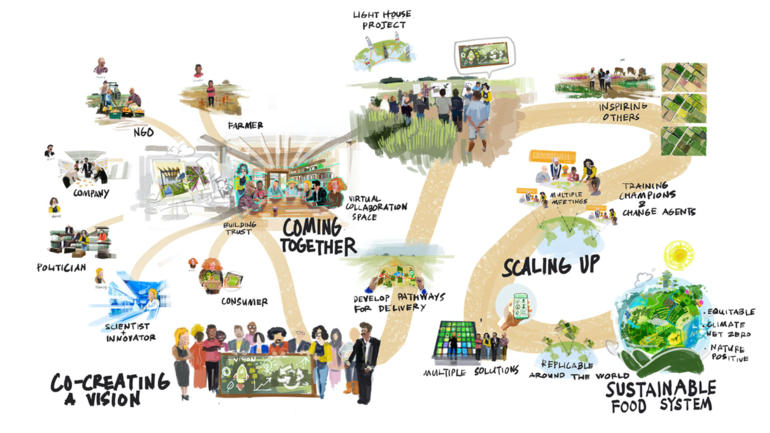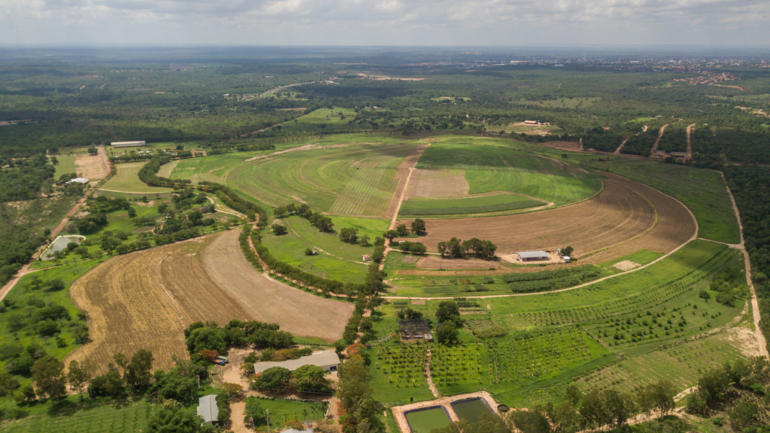Nature is deeply integrated into our lives. Our landscapes, lakes and oceans form the basis of global food chains, build resilience against natural disasters and climate change, but also provides economic value as a resource for business. A healthy natural world directly affects our prosperity and wellbeing, protecting us from risks such as diseases and allowing our economies to thrive. Business has a leading role to play in creating a clear and actionable path that is rooted in science and includes the following milestones: zero net loss of nature from 2020, being nature positive by 2030, and a full recovery by 2050
The decline of nature continues as ecosystems are being degraded at an unprecedented rate. Loss of nature will have a major effect on crop yields, give rise to approximately 140 million climate refugees by 2050 and reports indicate that more than half of the world’s total GDP is at moderate or severe risk from nature loss. The COVID-19 crisis has clearly demonstrated the impact that decline of nature can have on our socioeconomic system as it results in increased risks for human health, stable food supplies and other key economic systems such as our urban and energy infrastructures.
We can halt the loss of nature by prioritzing the restoration and regeneration of nature and biodiversity, and sustainable use of natural resources as a key part sustainability efforts. . Addressing climate action alone will not be enough. Setting commitments to act on nature is crucial to deliver on the Paris Agreement goals and building a sustainable future in which all people live well and within planetary boundaries.
The business case
There is a major incentive for business to play a critical role in protecting, restoring, regenerating and sustainably using our ecosystems. Business heavily relies on the value nature provides, using nature for resources, such as food and fiber, or ecosystem services, such as pollination of crops and climate regulation,. Collective business action can make a significant difference for restoring nature globally and minimizing short and long-term operational risks for businesses.
Our global economy and individual businesses have much to gain from addressing this crisis by developing economic models that can function in harmony with our planet. A shift to sustainable agriculture could generate USD $2 trillion per year of economic benefits, while also creating the sustainable jobs of the future. Protecting, restoring and sustainably using nature is an effective way to build resilience for businesses and ensure long-term sustainable growth while contributing to people’s wellbeing and reducing natural disaster risks.
Leading businesses are already committing and acting to reverse nature loss. But efforts to restore nature should go beyond the scope of business. Coalitions combining business and government, supported by NGOs and scientific research, are necessary to achieve our common goal. A collective business voice will help translate lessons learned into appropriate policy recommendations that can help to further scale up business action and empower everyone to act.
Forward for nature
The new decade started with a significant wake-up call in the form of COVID-19. Restoring nature will play a central role in the green recovery, and it must be driven by science-based targets and nature-based solutions. Businesses need to take a vital role in the needed transformation, but we must all act together. Partnering with policymakers and NGOs will aid in improving risk awareness and resilience in our supply chains and business models.
To spur this collective action, clear guidelines and frameworks are needed upon which everybody can build.
There are some crucial steps that will set the groundwork for these guidelines. Firstly, we need to establish definitions, align on an overarching goal and set science-based targets for nature. This will aid business in specifying how much and how quickly they need to reduce their impact on nature and in measuring their progress against those targets. The second step includes the increased research and implementation of nature-based solutions, which are inspired and supported by natural processes while still producing societal and economic benefits.
Companies need to work together on these crucial first steps in pre-competitive collaborations, so that everyone can build on the success of these actions and work towards environmentally sustainable ways that can restore balance to the Earth’s and societal systems.
Guiding the transition
Through its various projects and activities, WBCSD is taking a leading role in this transition. We do this by enabling knowledge-sharing across sectors, contributing to the development of science-based targets, creating more effective policy dialogues by bringing a collective global business voice to the table, as well as providing clear guidelines and practical advice.
In the short-term, WBCSD is establishing a group of leading companies across different sectors and different parts of the value chain that can demonstrate the positive impact of adopting science-based targets and nature-based solutions for restoring nature and biodiversity. Creating this frontrunner group will guide us to deliver impact at scale where the urgent agendas of climate, nature, food and societal systems intersect.
Through its Nature Action program, WBCSD is working with businesses, NGOs and policymakers to provide a clear and actionable path to being nature positive by 2030 and restoring nature by 2050. We do so by creating and hosting coalitions and projects, specifically aimed at:
- Promoting policy recommendations by bringing a collective global business voice to the table
- Developing guidance and contributing to science-based targets and frameworks
- Developing and aligning nature-based business solutions for collective action
- Mobilizing business leadership to push business action forward
- Creating awareness and enabling knowledge-sharing across sectors
Contributes to: Promoting policy recommendations by bringing a collective global business voice to the table.
Outline: Business for Nature is a global umbrella coalition bringing forward-thinking business and conservation organizations together, with the aim to demonstrate and amplify a powerful business voice that calls for policies that place nature at the heart of the global economy.
Contributes to: Developing guidance and contributing to science-based targets and frameworks.
Outline: Responding to the business demand to set targets for the whole Earth system, the Science-Based Targets Network looks to develop methods and resources that will enable companies and cities to set science-based targets for the interrelated systems of freshwater, biodiversity, land and the ocean across their value chains.
Contributes to: Developing and aligning nature-based business solutions for collective action
Outline: OP2B, a cross-sectorial coalition which includes business from across the value chain, aims to drive transformational systemic change that restores our biodiversity, with specific focus on agriculture. The coalition also engages with institutional and financial decision-makers and looks to develop and promote policy recommendations for the 2021 CBD COP15 framework.
Natural Climate Solutions Alliance
Contributes to: Mobilizing business leadership to push business action forward.
Outline: The Natural Climate Solutions (NCS) Alliance is a frontrunner CEO-led group of public and private stakeholders committed to implementing nature-based solutions that can help nature to regain its role of sequester and storing carbon
Contributes to: Creating awareness and enabling knowledge-sharing across sectors
Outline: Boosting the work of the Natural Capital Coalition, an international collaboration to harmonize the understanding of natural capital, We Value Nature is a campaign that aims to make valuing nature the ‘new normal’ across business in Europe.








